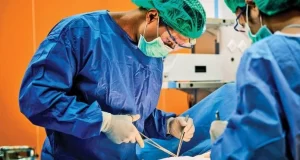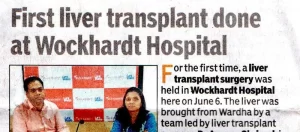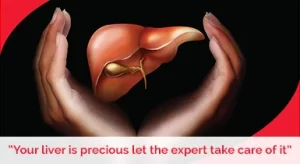Transplant Surgery is a relatively newer field in medicine field. It involves replacing an old and failed organ with a new organ. The surgery in which a diseased liver in a sick patient is replaced by a healthy liver obtained from a live donor or a dead donor is called Liver Transplant. The new healthy liver performs function to maintain the patient’s life and other necessary vital chemical equilibrium in his body. The healthy person from whom the liver is obtained is surgically is called Donor. The patient in whom the liver is transplanted is called as Recipient.
Liver diseases have been on the rise in India. As per the WHO data published in 2011, the disease figured among the top 20 causes of death in the country, taking the 9th spot.
Liver disease form 20% of the ailments and large percentage constitute Liver Cancer; approximately 2000 patients die of Liver Cancer annually.
Current Scenario of Liver Transplant in India
Liver Transplantation is a surgery in which a diseased liver in a patient is replaced by a healthy liver obtained from a live donor or a brain dead donor. Liver transplant may be the only treatment option where the vital functioning capacity of the liver ceases. Liver transplant replaces the diseased liver with a healthy liver from a deceased donor or with part of a liver from a living donor. The current scenario in India is about 25,000 Liver Transplantations are needed in India annually, but approximately only 1200 to 1400 patients are able to get the benefit of this surgery. Each year, thousands of liver patients die as they wait for a donor or the transplant itself. Despite all of this, there is an upside trend. Since the last 9 years with accelerated growth in liver transplants over last 3 years. Cost of liver transplant varies. At some centres would it can range of 5-7 lakhs and even more. At some of the private centres is in the range of 18 to 20 lakhs.
Liver Cirrhosis is a liver disease where the normal healthy tissue is replaced by scar tissue. Due to this the liver is not able to perform its regular functions. The disease is a slow progressing and blood flow is blocked in the liver, hampering the production of vital substance, from the liver affecting the overall health status of an individual.
Some causes of liver cirrhosis are:
Alcohol abuse, CHRONIC LIVER infection like hepatitis B & C, Fatty liver associated with obesity and diabetes are the most common causes of cirrhosis of the liver.
Liver Cirrhosis is the most common reason for a liver transplant and at Wockhardt Hospital we can provide this option having the infrastructure, clinical expertise and a transplant coordination team to assist in various organ donation protocols (liver donor or cadaver donor). All potential candidates for liver transplant undergo extensive testing to determine whether they are healthy enough to have a successful outcome following liver surgery.
Who is eligible (patient) for Liver Transplantation?
- Any person whose liver has suffered irreversible structural changes causing functional dysfunction and complications which cannot sustain his life is eligible for a Liver Transplant.
- Any acute liver disease (hepatitis) leading to irreversible liver failure and also chronically damaged liver with severely failed functions are apt conditions for Liver transplant treatment. These include:
- Acute Fulminant Hepatitis with Acute Liver Failure
- Cirrhosis of Liver
- Liver Cancer (nodular stage)
- Chronic Liver Failure
What are the Types of liver Transplant?
– Diseased donor Liver Transplantation (DDLT):
In this type of donation a person who suffers severe brain injury leading to brain death is selected. Family of deceased person are counselled and they agree to donate the organs as a gift of life on purely altruistic and voluntarily. Liver from such cadavers can be used for transplantation. Patients should be listed on the waiting list and organs are allocated as per Maharashtra Government rules by ZTCC ( Zonal Transplant Co-ordination Centre)which is not for profit Government organization of Liver Transplantation
– Live Donor Liver Transplantation (LDLT)
In Living Donor Part of the liver is taken from a healthy, relatively young person (18-55 yr) generally first degree blood relative, who is willing to donate to save life of his or her dear one.9 relationship have been defined as first degree by Government law are spouse,parents,grandparents,brother,sister,children,grandchildren. If no suitable donor is available from first degree relations, second degree or distant relatives can be considered. Approval from appropriate authority and state committee are required for living donor liver transplantation. Only after thorough check-up which also includes Psychologist and psychiatrist counselling, person is accepted as donor candidate
Advantages of Living Liver Donation:
Living liver organ donation provides those waiting for liver transplantation with many advantages over deceased organ donation.
These include:
- Shortened waiting times: The length of time it takes for an organ to become available is significantly reduced when the organ comes from a living donor versus a deceased donor.
- Healthier donor organ: Liver from a living donor is usually healthier than a liver from a deceased donor.
- Surgery can be scheduled electively: With living donor liver transplantation, it is possible for the recipient to have surgery earlier. This increases the chances for a quicker recovery.
- A feeling of satisfaction: For a living donor, knowing that he or she has made a contribution to improve health of another individual is a very positive psychological experience
What are the complications to the donor?
These include:
- Problems with the anaesthetic wound infections, pneumonia and blood clots in the lungs or legs
- Bleeding, Bile leakage and Psychological stress.
- It must be noted however that the vast majority of donors do extremely well and recover quickly from their surgery. The risks will be discussed at length when donors meet with the transplant team. Living Donor safety is the first priority of all transplant teams and utmost care is taken to ensure a thorough recovery.
What are the complications to the recipient?
- The risks in general would be the following. – Bleeding (during the surgery or in the postoperative
- Period)
- Infections and sepsis
- Reversible kidney damage
- Bile leaks
- Rejection
- Thrombosis or blocks of the connected major vessels
What happens after the surgery?
- The recipient operation goes on for around 8-12 hours. After the surgery, the patient would be in the ICU for approximately 3-5 days and shifted to the wards after that. The patient will have to stay for another 5-12 days in the wards. (depending on the clinical condition)
- The patient will have 3-5 tubes in his body and will be generally on a ventilator when he is shifted from the OT to the ICU.
- Continuous and vigorous monitoring will be done in the ICU. Your doctor will keep a close watch on the patient’s clinical observations, blood tests and any abnormal findings. The relatives will be constantly counselled and informed of the patient’s condition.
When can patient resume normal life after liver transplant surgery?
- Generally, after 3 months. Depending on your clinical condition and liver function tests, the doctors will deem you fit to resume your duties and lead a normal life again
How successful is liver transplant surgery?
- After Liver Transplant, About 95% of the patients undergo a successful Liver transplantation surgery.
- The patient returns to normal quality of life and resumes his work in three months. They achieve 95% of the quality of life as was prior to the liver disease.
- Although they need regular health supervision and monitoring, the health issues faced after the initial period are infrequent and the dosages of the medications too are reduced to an optimally required level.
Liver Transplant At Wockhardt Hospital
Wockhardt Hospitals, a chain of tertiary care super-specialty hospitals has more than 25 years of experience in the creation and management of Super Specialty Hospitals in India.
We are a premiere hospital in the country specializing in the liver transplant program. Wockhardt Hospitals, Mumbai Central, our Liver Specialists have the experience and expertise to accurately diagnose and offer world-class treatments for all forms of liver disease, including viral hepatitis, fatty liver, alcoholic liver disease, autoimmune liver diseases, genetic liver diseases and liver cancer.
We are well equipped to perform liver transplant and it is an essential component of a broad medical and surgical strategy to manage all patients with liver disease with the therapy most appropriate to that patient. The Liver Transplant departments at Wockhardt Hospitals, is fully equipped with modern and State-of-The-Art technology, intensive care unit services and modular and integrated operation theatre that match international health and safety norms. We have a dedicated team assured only by a multidisciplinary approach and quality of care ,which distinguishes us from others. We take proud in taking care of our patients holistically , our team includes Liver transplant Surgeons, Physicians, intensivist, Nutritionist, Physiotherapist. A good outcome can be ensured only by optimizing the condition of the patient
For further information or any gastroenterology services or liver transplant related query visit our experts at Wockhardt Hospital.
Wockhardt Hospitals is regarded as a centre of excellence the healthcare domain, having facilities in North Mumbai (Mira road), South Mumbai (Mumbai Central), Navi Mumbai (Vashi), Nagpur, Nasik, Rajkot and Surat. Wockhardt Hospitals has state-of-the-art infrastructure. Our prime objective is patient safety and quality of care at all levels. The guiding philosophy is to serve and enrich the Quality of Life of patients and to make life win.




